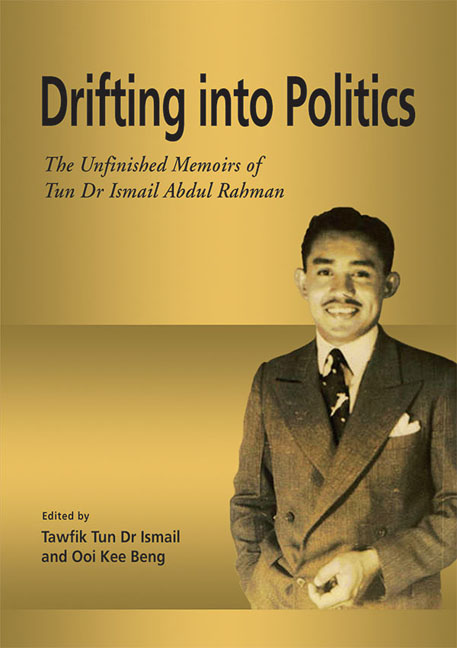Book contents
- Frontmatter
- Contents
- Preface
- INTRODUCTION
- CHRONOLOGY of Tun Dr Ismail bin Datuk Haji Abdul Rahman's Life (From The Reluctant Politician)
- REVIEW of The Reluctant Politician: Tun Dr Ismail and His Time (From Journal of the Malaysian Branch of the Royal Asiatic Society)
- Drifting into Politics: The Unfinished Memoirs of Tun Dr Ismail Abdul Rahman
- Chapter One
- Chapter Two
- Chapter Three
- Chapter Four
- Chapter Five
- Chapter Six
- Chapter Seven
- Chapter Eight
- Chapter Nine
- Chapter Ten
- Chapter Eleven
- Chapter Twelve
- Chapter Thirteen
- Chapter Fourteen
- Chapter Fifteen
- Chapter Sixteen
- Further Notes (30 March 1970)
- Further Notes (26 October 1972)
- Index
- About the Editors
Chapter Six
from Drifting into Politics: The Unfinished Memoirs of Tun Dr Ismail Abdul Rahman
Published online by Cambridge University Press: 19 May 2017
- Frontmatter
- Contents
- Preface
- INTRODUCTION
- CHRONOLOGY of Tun Dr Ismail bin Datuk Haji Abdul Rahman's Life (From The Reluctant Politician)
- REVIEW of The Reluctant Politician: Tun Dr Ismail and His Time (From Journal of the Malaysian Branch of the Royal Asiatic Society)
- Drifting into Politics: The Unfinished Memoirs of Tun Dr Ismail Abdul Rahman
- Chapter One
- Chapter Two
- Chapter Three
- Chapter Four
- Chapter Five
- Chapter Six
- Chapter Seven
- Chapter Eight
- Chapter Nine
- Chapter Ten
- Chapter Eleven
- Chapter Twelve
- Chapter Thirteen
- Chapter Fourteen
- Chapter Fifteen
- Chapter Sixteen
- Further Notes (30 March 1970)
- Further Notes (26 October 1972)
- Index
- About the Editors
Summary
The first couple of years of the Tunku's leadership were lean years indeed. I remember a few months after he became leader, he came to Johor Bahru and we had dinner at Dato Sardon Jubir's house. The Tunku was in a despondent mood. He said the party was in disarray, there was no money, and he had already started to sell his property to replenish the dwindling funds, and that the members were apathetic. My brother Suleiman suggested that he should combine his leadership with his legal practice. The Tunku said that the leadership of the party was a full-time job and that if he had to do it, he must do it properly. This is typical of the Tunku's philosophy: if he undertook a task, he would pursue it single-mindedly to the exclusion of other activities. I told the Tunku not to give up and that I was confident that he would achieve independence for the country.
Later, the Tunku and his family came to Johor Bahru which, at that time, was where UMNO had its headquarters. He had to live in a house in Kampong Kubor. It was an ordinary kampong house and it must have been terribly inconvenient for him and his family to adapt themselves to this new mode of living. His only daughter, who was learning hairdressing, had to walk no less than three miles daily to the salon.
I was then so engrossed in my political activities that I became interested in analysing the Tunku's method of working. Looking back now, his political philosophy and style never changed throughout his career as a politician. He knew that the first weakness of UMNO that had to be remedied was its propaganda. UMNO had no newspaper backing and its own newspaper Suara Merdeka (Voice of Independence) hardly had any circulation at all.
There were two major tasks during the first few months of Tunku's leadership. First, the party had to be strengthened and second, there had to be a plan for the achievement of independence. After months of hard work, we succeeded in finally purging UMNO of those party leaders who were loyal to Dato Onn and those whose objective in remaining in the party was to sabotage the party from within.
- Type
- Chapter
- Information
- Drifting into PoliticsThe Unfinished Memoirs of Tun Dr Ismail Abdul Rahman, pp. 30 - 32Publisher: ISEAS–Yusof Ishak InstitutePrint publication year: 2015

